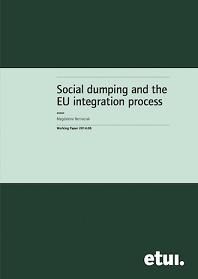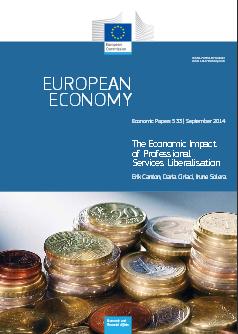Bernaciak, M. (2014) “Social Dumping and EU Integration Process“, European Trade Union Institute (ETUI), Working Paper 2014.06, 14 Οκτωβρίου. Abstract This paper proposes a conceptualization of social dumping and applies it to an analysis of the EU integration process. Building on recent contributions in the fields of economic theory, economic sociology and institutional political economy, it defines social dumping as the practice, undertaken by self-interested market participants, of undermining …Read More
Busts hurt more than booms help: New lessons for growth policy from global wellbeing surveys
De Neve, J. E. & Norton, M. (2014) “Busts hurt more than booms help: New lessons for growth policy from global wellbeing surveys“, VoxEU Organisation, 08 Οκτωβρίου. Wellbeing measures allow us to distinguish higher incomes from higher happiness. This column looks at new welfare measures and macroeconomic fluctuations. It presents evidence that the life satisfaction of individuals is between two and eight times more sensitive to negative economic growth …Read More
The who and how of disappearing routine jobs
Cortes, M., Jaimovich, N., Nekarda, J. C. & Siu, H. (2014) “The who and how of disappearing routine jobs“, VoxEU Organisation, 02 Οκτωβρίου. As routine tasks are increasingly automated, middle-wage jobs are becoming rarer. This column documents the changes in labour-market dynamics behind polarisation, and investigates which workers are affected by it. Flows into middle-wage routine jobs are declining (rather than flows out increasing). Interestingly, routine cognitive workers – …Read More
The Economic Impact of Professional Services Liberalisation
Canton, E., Ciriaci, D. & Solera, I. (2014) “The Economic Impact of Professional Services Liberalisation“, European Economy. Economic Papers. 533. Σεπτέμβριος 2014 Competition in professional services is, in some occasions, hindered by excessive regulation. This may constrain business dynamics (entry and exit of firms) and create inefficiencies and excessive rents. To improve market performance in those professional services generally regulated, several EU countries have reduced regulatory restrictions regarding the …Read More
Cross-country differences in perceptions of inequality
Niehues, J. (2014) “Cross-country differences in perceptions of inequality“, VoxEU Organisation, 28 Σεπτεμβρίου. Income inequality is high in the US, but the support of social welfare programmes is low. In Europe, income inequality is low and the welfare states are generous. This column argues that this paradox is largely due to perceived inequality. Many Europeans believe that there is high inequality in their countries, justifying the need for redistributive …Read More
The European School-to-work Transition and the Crisis
Giuliani, L. & Pastore, F. (2014) “The European School-to-work Transition and the Crisis“, Social Europe Journal, 16 Σεπτεμβρίου. The school-to-work transition is a long, dark tunnel for many young people around the world. However, the problem is not the same everywhere; in Germany, for example, young people have almost the same probability of working as adults, while in the Eastern and Mediterranean EU countries the employment chances of young …Read More
Migration states and welfare states: Why is America different from Europe?
Razin, A. & Sadka, E. (2014) “Migration states and welfare states: Why is America different from Europe?“, VoxEU Organisation, 01 Σεπτεμβρίου. European migration exhibits a bias towards low-skilled workers, whereas the US attracts the majority of the world’s skilled migrants. At the same time, the welfare system in Europe is more generous than the one in the US. This column describes an analytical framework that can explain the existence …Read More
The computerisation of European jobs – who will win and who will lose from the impact of new technology onto old areas of employment?
Bowles, J. (2014) “The computerisation of European jobs – who will win and who will lose from the impact of new technology onto old areas of employment?“, Bruegel Institute, 17 Ιουλίου. Who will win and who will lose from the impact of new technology onto old areas of employment? This is a centuries-old question but new literature, which we apply here to the European case, provides some interesting implications. …Read More
On the transnational social question: How social inequalities are reproduced in Europe
Faist, Τ. (2014) “On the transnational social question: How social inequalities are reproduced in Europe“, Journal of European Social Policy, Vol. 24, No. 3, σσ. 207-222, Ιούλιος. What are the consequences of cross-border employment and social protection practices for social inequalities in Europe? The transnational social question is a multifaceted one: it is linked not only to inequalities generated by heterogeneities such as class, gender, ethnicity, legal status and …Read More
Inequality in the long run
Piketty, T. & Saez, E. (2014) “Inequality in the long run“, Science, 23 Μαΐου, Vol. 344 no. 6186 σσ. 838-843. This Review presents basic facts regarding the long-run evolution of income and wealth inequality in Europe and the United States. Income and wealth inequality was very high a century ago, particularly in Europe, but dropped dramatically in the first half of the 20th century. Income inequality has surged back …Read More






